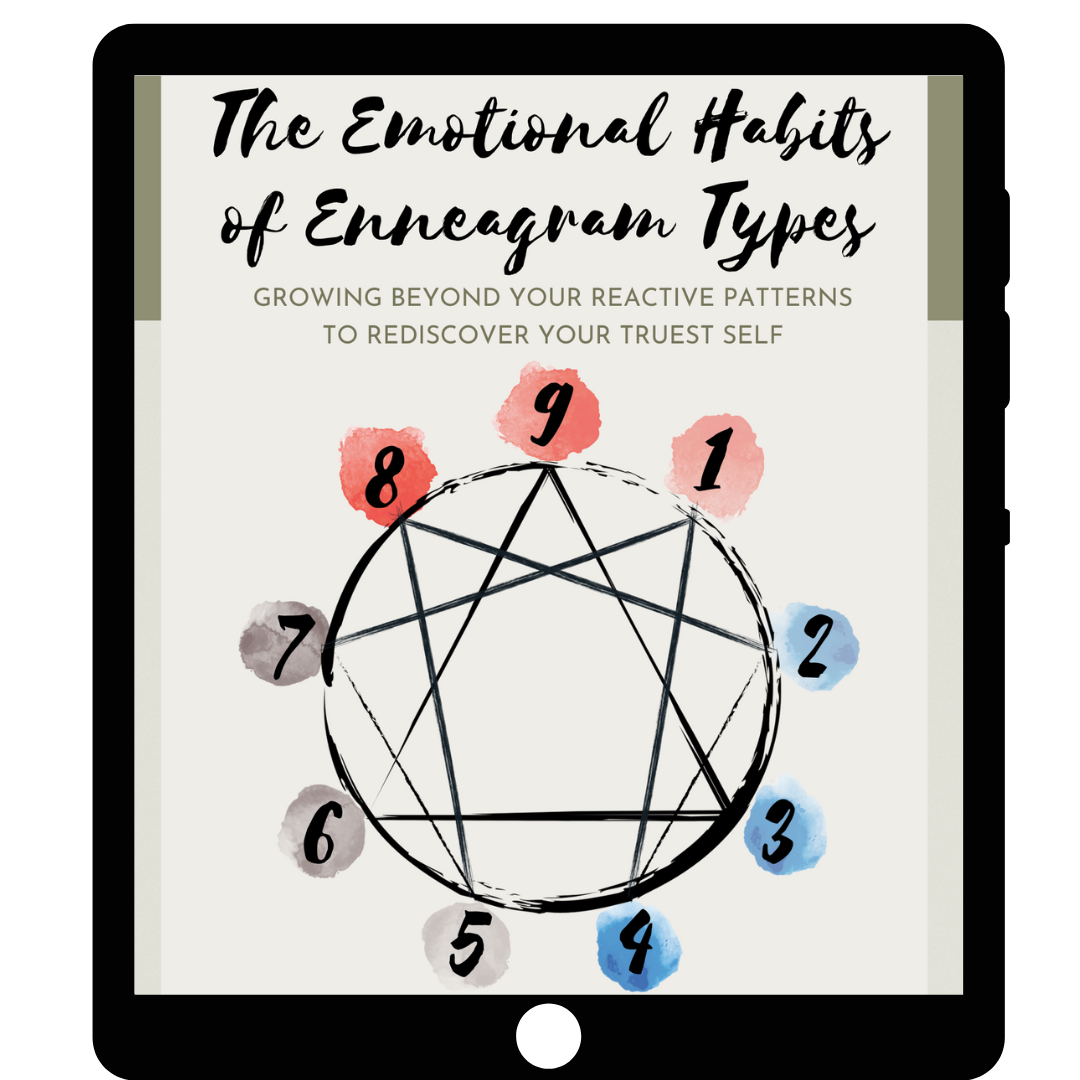My therapist colleague Melinda Olsen (Inviterra Counseling) and I are writing several blog series about the Enneagram, a comprehensive yet compact personality framework that reveals our reactive, “autopilot” patterns of thinking, feeling, doing, and relating.
In this series, someone from each Enneagram Type (Types One through Nine) will be sharing about their own journey of discovering and using the Enneagram for deep healing and personal growth.
In today’s post, we’ll be hearing from fellow clinician Morgan Hancock (Licensed Marriage and Family Therapist) about being in the world as a Type 3.
Here are the other posts in this series that are published so far:
Type 1 - Josh Chan
Type 2 - Melinda Olsen, LMFT
Type 4 - Joanne Kim, LMFT
Type 5 - Alyssa Harris
Type 6 - Jonathan Siu
Type 7 - Stefie Dominguez
Type 8 - Marianna Torres
Type 9 - Lorren Siu, LMFT
What does it mean to be an Enneagram 3?
Performing
3’s are Performers. In my day-to-day, I think through what others may think about if they were on a stage, or getting ready to perform. There’s lots of preparation behind the scenes, lots of practice, and asking myself: “what would the audience be amazed by?”
The only difference is my stage rarely ever goes away. I will perform for strangers, friends, and even for myself; whether I’m with or without people. 3’s are “scanners” - constantly scanning our audience that we want to impress. I take in information about others with my feelings to know how I need to be in that interaction to make someone think I’m awesome or to make sure the interaction reaches its intended goal.
I want to appear successful, I want the people I love to be successful, and the groups that I associate with to be successful. If I get the sense that the team needs a fun vibe for the outing to be successful, then I can create a fun vibe. If someone is going to be impressed by my intellect, then I will try as hard as I can to be intellectual even if it means studying for hours on a topic beforehand. If I get the sense that someone values authenticity (most therapists), then ironically, I will perform authenticity. If you are reading this and getting exhausted, then you are feeling how most of us 3’s feel if we are really honest with ourselves. It takes a lot of work to impress you.
Need to Be Seen
An innate quality about being human is the need to be seen. 3’s try to stand out in order to be seen - we have to be better than others in order to be seen and recognized. We learned that people only have enough time to really see those closest to them, so they rely on impressions of others. Impressions are where 3’s live.
A quick way to be seen in the world is by achievement (especially in the US), status and titles, and the image we create of ourselves externally. Most companies will have productivity quotas to achieve levels of rank and those people are recognized.
However, achievement is only what we do in order to be seen. If the high achievers aren’t the most seen or recognized, then we can adapt to a new set of rules to be seen. Sometimes the most recognized are those who speak eloquently, dress nice, are happiest, you name it. We work hard at getting this quick fix to be seen by people who don’t really know us. We’ll get competitive with those who are seen more. We know quickly who the favorite, most recognized person is and then try to out-shine them.
3’s mistake this way of being seen in the world for actually being seen - the kind of being seen when someone gets to know our heart - the joy of receiving love for simply being ourselves. Even though we have a lot of feelings like others in the heart triad, we have disconnected from them because it wasn’t as valued in our early years as much as what we did or appeared to be for others. Therefore, we have a sense that there isn’t a heart to be loved and valued, only a façade to be awarded and applauded.
Outside-In:
3’s in their personality care more about what is on the outside (because it’s more seen) than what’s on the inside. We are future-oriented and can look ahead to that week or month of what is going to be seen so that I can make myself appear well. We start from the outside layers of ourselves:
Are people going to see our social media? Check.
Are people going to see our workspace? Check.
Are people going to see our car? Check.
Will our boss be looking at our performance? Check.
When those tasks are complete, we might have time left over for what others won’t see: laundry, emails, a book we wanted to read, a friend hangout that won’t be posted to social media, etc.
Drill Sergeant:
If 1’s have a critical voice in their heads, 3’s have drill sergeants in their heads. Everything needs to be fast, efficient, and there’s no time for rest. Once we have finished something, we’re onto the next task. We have the ability to have a long list of things to do and won’t stop till everything is done. We can’t feel that we are tired or sad until we stop, so most 3’s don’t like to stop.
This is where I feel 3’s are so disconnected from others and lack empathy - we look at others like, “What do you mean you’re tired?” We have limitations just like everyone else, but often can’t feel it until it’s too late - we get sick, have overwhelming anxiety, or get an injury.
When did you first realize you were Enneagram Three?
I took an online test and was like, “Yep, that’s me.” At that time, I knew what a 3 meant on the surface, but didn’t realize all the ins-and-outs. I started working at a nonprofit after grad school and the other therapists were all about discussing the Enneagram. In those discussions, I immediately started hating that I was a 3. I’ve heard that 3’s have the hardest time with their number, and that was consistent with my experience. My tricks of how to win at life were exposed and people could see right through my image. I then compensated by learning everything about my number so that I could joke about my shame instead of trying to hide it since people knew what I was doing anyways.
What do you wish people knew about your type?
If you love a 3 in your life, tell them why. We go through our lives actually thinking that people love us because of our accomplishments, confidence, assertiveness, etc. when in fact, people love us just because they like who we are. We need to hear the song, “It’s You I Like” by Mr. Rogers. I didn’t realize I needed this until a classmate in grad school came up to me and was like, “I really like you!” She almost shouted it, and it took me back because I hadn’t done anything really to try to impress her. Months later, I asked her what I did that made her like me so much and she said, “I just like you for you.” I will never forget that. Even though we have graduated and live in different towns, we still keep in touch.
What’s one thing you’re focusing on working on to "work out" of the Type 3 autopilot?
I’m learning to let go of how I’m perceived by other people. They may think I’m amazing; they may not. I have very little control over what people see, even though being a 3 makes me think that I can change the way people think about me. Releasing this control allows me to focus more on taking care of myself - my own well-being and what I want to receive from life rather than what I want to do for it.
Truth is, people only know me and see me if they get to know me and see me, which takes a lot of time and effort. Everyone else only gets fragments of my real self, and for better or worse, it’s only part of the story and only part true. I have about 5 friends that know me like the back of their hand that can tell me who I am when I get lost. They have managed to be safe enough to know the real me and have loved me consistently through my appealing and not-so-appealing times.
What are your Enneagram type's emotional habits?
Grab this free guide that shows you how to grow beyond the patterns that keep you stuck!
Don't know your Enneagram type?
© Copyright 2022 Joanne B. Kim. All rights reserved.
JOANNE B. KIM, LMFT
Joanne is a Licensed Marriage & Family Therapist and Certified Brainspotting Practitioner in San Jose, CA, who loves helping people create emotionally thriving relationships. She helps people EXHAUSTED by anxiety, shame, and an allergic reaction to anger create VIBRANT relationships where they matter, too.
Many of her clients are:
(1) the highly responsible, conscientious, and empathic types
(2) Enneagram Type Ones, Twos, Fours, or Nines
(3) Highly Sensitive Persons (HSPs)
(4) adult survivors of emotional abuse and neglect
The most common words spoken by those who’ve sat with Joanne:
“I thought it was just me. I’m NOT crazy!”
“I can finally figure out what to do with all these feelings!”






















I was a panelist at the EnneaSummit 2024 for the Enneagram Practitioner Panel.
In this panel, we share our experiences and observations about what different Enneagram types think they need in therapy, what they actually need, and some important growth steps so they can grow beyond their type.